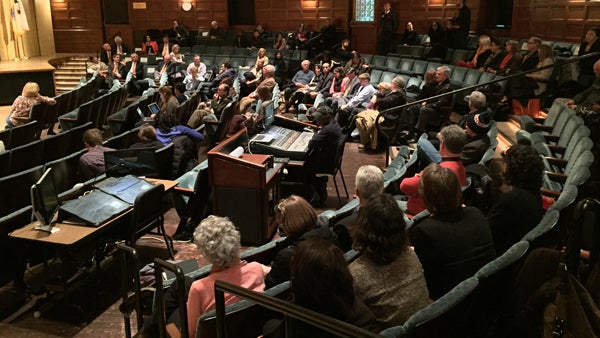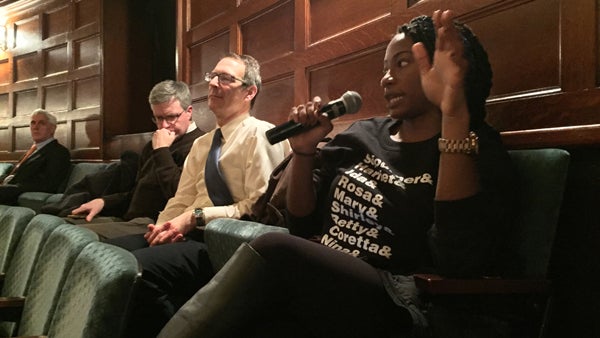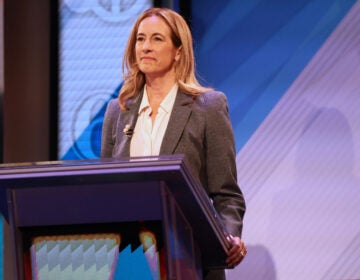Princeton University holds public hearing on Woodrow Wilson’s racial views
Listen
Princeton graduate Harvey Rothberg said Woodrow Wilson's name should remain on the university's public policy school and one of its residential colleges but acknowledged the former president's racist legacy. (Joe Hernandez/WHYY)
Following through on one of its promises to student protesters last year, Princeton University held a public forum on Friday to discuss the possibility of removing the name of former university president Woodrow Wilson from campus, in response to what many said were his racist policies and attitudes. Wilson served as Princeton University’s president from 1902-1910.
The town hall-style meeting came exactly three months after a group of Princeton students called the Black Justice League occupied the office of university president Christopher Eisgruber, demanding the removal of Wilson’s name and adding more inclusive policies on campus.
Among the speakers were some of the students that staged the sit-in, like Joanna Anyanwu, who has attended the renowned Woodrow Wilson School of Public and International Affairs for the past five years. She said, knowing what we know about Wilson’s racist past, keeping his name on her program sends the wrong message. “What we’re saying is that this notion of prestige is far more important than the experiences of the students who currently inhabit those spaces and don’t have the choice of leaving those spaces,” Anyanwu told the audience of roughly 100 people.
Graduate student Heath Pearson questioned the hesitation among some members of the Princeton community to do away with Wilson’s name, especially at a university that prides itself on training some of the best intellectual minds in the world, he said.
“Are we creating an environment where we’re so afraid to change something in our tradition that we won’t do anything different for the present or for the future?,” Pearson said, and suggested the formation of a review committee that is more representative of Princeton students and staff.
 About 100 people attended an open public forum inside Princeton University’s Richardson Auditorium to discuss removing the name of Woodrow Wilson, who many criticize for his racist policies and attitudes, from campus buildings. (Joe Hernandez/WHYY)
About 100 people attended an open public forum inside Princeton University’s Richardson Auditorium to discuss removing the name of Woodrow Wilson, who many criticize for his racist policies and attitudes, from campus buildings. (Joe Hernandez/WHYY)
Wilson, whose presidential campaign promised fair treatment for all citizens, reversed his position when he became president. Under his administration, black workers were either dismissed or were seperate working areas away from white staffers.
Other attendees at the meeting, however, opposed the idea of removing Wilson’s name from the policy school and Wilson College, one of Princeton’s six residential colleges.
Harvey Rothberg, who graduated from Princeton University in 1949, supported keeping Wilson’s name but suggested that the school install a plaque detailing the former president’s achievements as well as his shortcomings.
“It’s essential that all students — black, white, alumni, visitors — be aware of who Wilson was and what he did and his accomplishments, mostly good and occasionally not so good,” said Rothberg.
 First-year graduate student Joanna Anyanwu called for the removal of Woodrow Wilson’s name from a residential college and the university’s public policy school. (Joe Hernandez/WHYY)
First-year graduate student Joanna Anyanwu called for the removal of Woodrow Wilson’s name from a residential college and the university’s public policy school. (Joe Hernandez/WHYY)
Colter Smith, a junior, said a plaque could clarify the specific reasons why Princeton University honors Wilson. “We’re not commemorating everything that Woodrow Wilson did,” he said. “We’re commemorating him for specific things that we believe to be consistent with our values today.”
In addition to the open public forum, the committee held 11 small-group discussions to solicit feedback.
It also set up a website for public comments, which has received more than 600 responses.
“Talking about race is very difficult,” said Brent Henry, chair of the Wilson Legacy Review Committee. “Our goal … is to send recommendations to the Board [of Trustees] … that have the goal of creating a community here at Princeton that is an inclusive community, a community that we all feel that we should be part of and belong to, and feel that the university belongs to us.”
The committee expects to issue its recommendations on the name change in the spring. The Board of Trustees will make the final determination.
WHYY is your source for fact-based, in-depth journalism and information. As a nonprofit organization, we rely on financial support from readers like you. Please give today.




